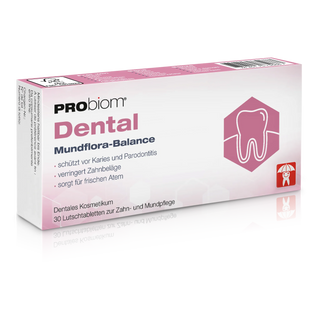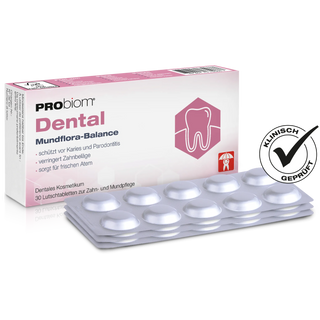Bad breath is a sensitive topic – yet it affects millions of people worldwide. Studies estimate that up to 30% of the population regularly suffers from halitosis (the medical term). Those affected are often the last to know about it – because hardly anyone dares to speak directly to others about it. Yet there is clear scientific evidence about what lies behind bad breath – and how to combat it specifically.
In this article, you'll learn why bad breath occurs, what role your oral microbiome plays, and how you can counteract it with five well-founded measures. One of them: targeted use of probiotics , which can sustainably improve the bacterial balance in your mouth.
What is bad breath anyway?
Bad breath predominantly originates in the mouth itself – only about 10% of cases have an organic cause outside the mouth, such as stomach problems or respiratory diseases. In most cases, anaerobic bacteria (those that live without oxygen) produce sulfur-containing gases when breaking down proteins. These so-called volatile sulfur compounds (VSCs) – such as hydrogen sulfide or methyl mercaptan – have an unpleasant, foul or metallic odor.
The bacteria are found primarily in niches in the mouth: between teeth, between gum pockets, on the tongue, or in the tonsil crypts. If these areas aren't cleaned regularly or if there is an imbalance in the oral microbiome, the putrefactive bacteria gain the upper hand – and bad breath develops.
Tip 1: Tongue cleaning – the underestimated key
The tongue is one of the major odor producers in the oral cavity. Dead cells, food debris, bacteria, and their metabolic products accumulate, particularly in the posterior third. This "biofilm" can be a major source of VSCs.
Regular tongue cleaning with a tongue scraper (not a toothbrush!) effectively removes these deposits. Studies show that this can significantly reduce the concentration of sulfur compounds in the breath. Ideally, you should use a stainless steel scraper, as it is more hygienic than plastic. Daily use – preferably in the morning after waking up – is sufficient.
Bonus tip: Combine tongue cleaning with a plant-based antibacterial mouthwash to deactivate any remaining bacteria.
Tip 2: Nutrition – your breath begins on your plate
What you eat affects not only your body but also your breath. Garlic, onions, and coffee are obvious culprits. But there are also lesser-known connections.
A protein-rich diet promotes the production of VSCs, as the bacteria break down proteins into amino acids such as cysteine or methionine – which in turn release sulfur compounds. The problem can be particularly exacerbated by low-carb diets because saliva flow decreases and the acidic environment promotes the growth of anaerobic bacteria.
Instead, choose foods that:
-
Stimulate saliva flow (e.g. fresh herbs, celery, apples)
-
Contain polyphenols that have antimicrobial effects (e.g. green tea, cranberries, cinnamon)
-
Provide fiber to diversify the oral microbiome
A diet rich in plant-based components, sufficient fluids and moderate protein intake can therefore noticeably contribute to freshness in the mouth.
Tip 3: Dental and interdental care – more than just brushing your teeth
Brushing your teeth twice a day is standard practice – but that's usually not enough to prevent bad breath. 90% of harmful bacteria are found between the teeth or in the gum pockets. Toothbrushes don't stand a chance there.
What you need is consistent interdental care:
-
Dental floss for tight spaces
-
Interdental brushes for larger gaps or periodontitis
-
Oral irrigators as a supplement for sensitive gums
Not only the mechanical removal of plaque is important, but also the control of inflammatory processes – because gum inflammation (gingivitis, periodontitis) is a common cause of VSCs.
Visiting the dentist every 6 months, getting professional teeth cleanings, and not smoking also help keep the oral microbiome in balance.
Tip 4: Probiotics – Bacteria against bacteria
This may sound contradictory at first: bacteria for bad breath? But that's precisely the approach of modern oral probiotics. Not all bacteria in the mouth are bad—many fulfill an important protective function.
When the balance in the microbiome tips, certain probiotic strains can help regulate the environment. According to studies, the following are particularly effective against bad breath:
-
Streptococcus salivarius M18
This strain produces so-called bacteriocins, which can suppress pathogenic bacteria such as Fusobacterium nucleatum or Solobacterium moorei – both of which are considered to be the main cause of VSCs. -
Lactobacillus reuteri DSM 17938
This strain can reduce inflammation in the gums and thus indirectly minimize the source of unpleasant gases. -
White rind cheese probiotics (e.g. Lactobacillus casei)
Some studies show that regular consumption of probiotic foods (such as fermented cheese or kefir) can stabilize the oral microbiome.
The supplement should be taken regularly and for at least four weeks . Lozenges or oral sprays are particularly recommended – this way, the probiotic cultures reach the target area directly.
Tip 5: Activate saliva & avoid dryness
Dry mouth is one of the most common causes of bad breath. Saliva has antibacterial properties, neutralizes acids, and carries away food residue. If there is too little saliva—e.g., due to stress, medication, alcohol, or not drinking enough—the oral mucosa dries out, allowing bacteria to multiply unhindered.
What helps:
-
Drink enough: At least 2 liters of water per day, regularly distributed throughout the day
-
Sugar-free chewing gum: They stimulate saliva flow and have a mechanical cleansing effect
-
Mouthwashes with xylitol or aloe vera: These have a moisturizing and antibacterial effect
-
Avoid sugary sweets: These promote tooth decay and the growth of odor-causing germs
Saliva activity is particularly low in the morning and at night – therefore tongue cleaning and drinking water after getting up is especially important.
The connection between psyche, intestines and bad breath
An often overlooked aspect: Bad breath can be exacerbated by psychological stress . Stress reduces saliva production, changes eating habits, and weakens the immune system—which in turn disrupts oral balance.
There is also evidence of a connection between the gut microbiome and oral flora. Studies show that people with dysbiosis (imbalance in the gut) are more likely to suffer from gingivitis and bad breath. A holistic approach can help here:
-
Gut-friendly diet
-
Fiber and prebiotics
-
Targeted probiotic supplementation
Conclusion: Fresh breath is no coincidence
Bad breath isn't a cosmetic problem—it's a sign of a microbial imbalance in the mouth. The good news: With the right knowledge and a bit of discipline, the problem can be solved long-term.
The most important levers:
-
Daily tongue cleaning with a high-quality scraper
-
Microbiome-friendly diet with plenty of fluids
-
Thorough interdental care – beyond toothbrushes
-
Targeted intake of oral probiotics for environmental regulation
-
Activation of saliva production and stress reduction
Fresh breath is not a coincidence – but an interplay of oral hygiene, microbiology and lifestyle.













